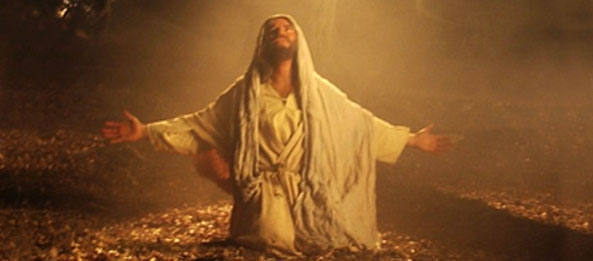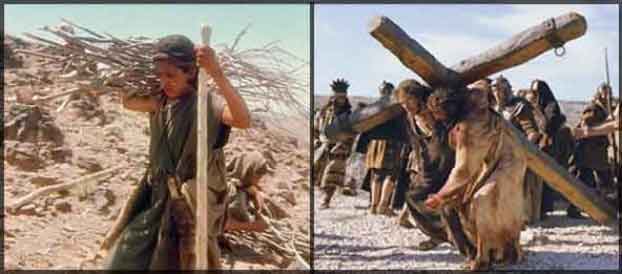“My God, My God, Why?”
– Understanding the words of the crucified One
‘My God, my God, why have you forsaken me?’ This was the cry of Jesus as he hung on the cross (Matthew 27.46). His cry has engendered much speculation. Some sceptics say he finally realized his mission had gone wrong, and that he was in state of shock about all that was happening to him.
This is not true; it’s quite clear what Jesus was doing. He was screaming out the first verse of Psalm 22. That’s right, go read it. It’s a word for word quotation.
Now, when do you quote a Psalm, when you are in shock and think you made a big mistake, or when you need strength and confirmation that you are in God’s will? Quite clearly you do it when you need strength and confirmation. And if you read Psalm 22 right through it’s quite obvious that it’s a Psalm that predicts the suffering of the Messiah and it is therefore the most obvious Psalm for Jesus to look to for strength in his situation.
Let me highlight a few verses of Psalm 22 to show you what I mean:
In verse 16 it says ‘Dogs surround me, a pack of villains encircles me; they pierce my hands and my feet.’ You can imagine the soldiers gathering around Jesus to hammer the six inch nails through his limbs and him thinking, ‘Oh, here we go, the Psalm said it would happen.’ Would that have given him strength to endure the nails? It would certainly have helped; prophecy that it would happen to the Messiah reinforced the fact that he was on track and doing the Father’s will.
In verses 7-8 it says ‘All who see me mock me; they hurl insults, shaking their heads. “He trusts in the Lord,” they say, “let the Lord rescue him. Let him deliver him, since he delights in him.” The mockers gathered around Jesus’ cross said “He saved others, but he can’t save himself! He’s the king of Israel! Let him come down now from the cross, and we will believe in him. He trusts in God. Let God rescue him now if he wants him, for he said, ‘I am the Son of God.’” Again Jesus must have thought ‘It’s happening just as the Psalm said it would.’ Would this have strengthened him to face such mockery? Of course it would!
In verse 15 it says ‘My mouth is dried up like a potsherd, and my tongue sticks to the roof of my mouth.’ AsJesus hung on the cross he started dehydrating so he said, “I am thirsty.” Then John who was watching describes the actions of those who heard him; ‘A jar of wine vinegar was there, so they soaked a sponge in it, put the sponge on a stalk of the hyssop plant, and lifted it to Jesus’ lips’ (John 19:28-29). At the time of this thirst Jesus must have thought ‘Ah, the Psalm said this thirst would come.’ Would have helped him endure the thirst? Absolutely!
In verse 18 it says ‘They divide my clothes among them and cast lots for my garment.’ This happened exactly as described. John said ‘When the soldiers crucified Jesus, they took his clothes, dividing them into four shares, one for each of them, with the undergarment remaining. This garment was seamless, woven in one piece from top to bottom. “Let’s not tear it,” they said to one another. “Let’s decide by lot who will get it”’ (John 19:23-24). Jesus watched all of this from the cross and as he did so he must have thought ‘It’s all happening just as the Psalm said it would.’
As Psalm 22 unfolded at the crucifixion Jesus must have mentally ticked each verse saying, ‘That’s done … oh, and now that’s done too … oh, and now this one …’ Each time something was fulfilled it confirmed that he was in the Father’s will, and this would have given him great strength when he needed it most.
The last half of Psalm 22 talks about the things that the suffering and resurrection of Jesus would achieve. It says ‘The poor will eat and be satisfied’ (26), ‘All the ends of the earth will remember and turn to the Lord, and all the families of the nations will bow down before him’ (27), ‘All the rich of the earth will feast and worship; all who go down to the dust will kneel before him’ (29), ‘Posterity will serve him; future generations will be told about the Lord. They will proclaim his righteousness, declaring to a people yet unborn: He has done it!’’ (30-31). These verses would have been greatly encouraging to Jesus as they reminded him that his suffering and death were achieving things of eternal magnitude.
But I would like to end this post by focusing on those final four words of Psalm 22. It simply says ‘He has done it!’ (31), and since Jesus was the one doing it on the cross, as he breathed his final breath he simply said “It is finished” (John 19:30). Matthew and Mark record Jesus saying ‘My God, my God, why have you forsaken me?’ And John records him saying “It is finished.” These are the first and the last verses of Psalm 22. He spoke the first and last verses in belief that he had fulfilled everything that the Psalm spoke of. So the words ‘My God, my God, why have you forsaken me?’ were not shouted in shock and confusion, they were shouted with understanding and a sense of victory. The crucifixion predictions of Psalm 22 were fulfilled and the mission of the suffering Messiah was complete. He had done it!







